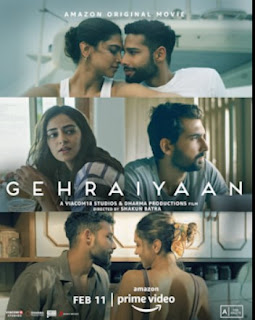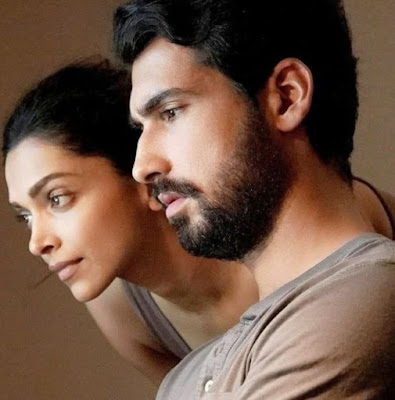 |
|
Directed by: Shakun Batra Music: Kabir Kathpalia Starring: Deepika Padukone, Siddhant Chaturvedi Ananya Pandey, Dhairya Karwe, Rajat Kapoor, Naseeruddin Shah |
I like all things Deepika Padukone. (If that sentence does not make any sense, it is because Deepika turns my brains into mush.) But my favourite actor has been missing from screen for far too long (and no, a cameo in 83 does not count). So, when Shakun Batra’s Gehraiyaan released, I was thrilled. The trailer looked promising. Besides, I liked both of Shakun’s previous films – Kapoor & Sons, and Ek Main aur Ek Tu. That’s to say, I liked his take on dysfunctional families. And because I wanted to chew on this film while I watched it, I asked Shalini if she wanted to watch it with me. Now, that’s a mixed blessing. Watching with Shalini is always fun, but she doesn’t like Deepika (she’s nuts!). But, out of sheer love for me (huh!), she agreed, on condition that she would be allowed to snark. Deciding that I could always ignore her snark (it’s on chat after all, not verbal), I gladly said yes. Did Shalini hate the movie? Did she snark so much I had to stick a voodoo doll with pins to hex her? Read on…
Gehraiyaan (Depths) is the story of four people – Alisha (Deepika Padukone), Karan (Dhairya Karwa), Tia (Ananya Pandey) and Zian (Siddhant Chaturvedi).
Alisha, a yoga teacher, is sick of being stuck in a dead-end job as a yoga instructor. Her live-in boyfriend, Karan, is a wealthy young man who’s given up his well-paying corporate job to indulge his ambition of being a writer. Haunted by memories of her mother’s suicide. estranged from her father whom she blames for the incident, and plagued by anxiety which she regularly medicates, Alisha is like a tightly coiled spring waiting to snap. It doesn’t help that she has to do the heavy lifting in their relationship.
The weekend is fraught with unstated tensions – Alisha can’t help contrasting Tia’s well-appointed summer bungalow (a place where she had spent many happy years as a child) with her own modest rented flat, and the former’s obvious wealth with her own straitened circumstances. And there are hints of bitterness, of events that drove their families apart though it is clear that there is still real affection between the sisters.
Zian is an outgoing, exuberant, flashy real estate developer, who likes to live on the edge. He flirts openly with Alisha, whose relationship with Kabir has lately stagnated, when they are not fighting over unpaid bills and undone chores. The flirting is initially harmless, and Alisha even teases him about it, but it is clear that after years of being taken for granted, Zian makes her feel wanted and desirable.
The story of late-20s, thirty-somethings seeking love without rose-coloured lenses, Gehraiyaan isn’t a straight relationship drama. As Shakun dives yet again into the messiness of modern relationships, we get love, lust, secrets, betrayal, fraud, and… what you get is a more intimate, and nuanced take on the complexities of modern relationships. Gehraiyaan polarised audiences, a part of whom felt that it glorified infidelity (which, of course, is ‘western’ in concept), while others were thrown off by the twist that takes the film into darker territory.
[For Shalini and me, that twist made the film more intriguing.]
Gehraiyaan did a very good job of showing how life isn’t passive or driven by luck. Nor does it manipulate you into feeling a specific way about any of the characters or the choices they make. That’s unexpectedly mature [of a Hindi film]. People are complex – no one is completely saint or sinner.
Shakun and his co-writers, Ayesha Divitre, Sumit Roy and Yash Sahai write a messy, complicated tale of fraught relationships and of people who can’t move on from their pasts. At 2.5 hours, the film did stretch a bit and could have done with the services of a better editor, but on the whole, it was a satisfying watch.
As always, Shalini and I tend to dissect movies for a while after we watch. I was supremely glad that she didn’t hate the film. But she disagreed with the choices; I was more ambivalent. Perhaps because I’ve seen that life cannot be viewed through a binary lens. Relationships are this messy in real life, even without an adulterous affair (or any affair, actually) to complicate things. Especially when families have history.
S: To me, it wasn’t as much about seeing things in a binary way, as much as valuing integrity.
A: True. But life isn’t always black and white. And you never know what you are capable of doing just to survive. Mostly, I am glad not to have been in Alisha’s shoes. Or even Tia’s. All four protagonists are shaped, even damaged by their pasts, but they all make very different choices.
A: Exactly. And circumstances can change good intentions and force you into making ‘practical’ choices, even if they aren’t the most moral ones.
S: Or emotional needs that drive us are more powerful than reason. Zain is the most morally compromised of the four, but given his past, you can understand his desperation/determination to escape that past and succeed – whatever the cost to others.
A: I know, for me, it's hard to make a rational decision when I'm emotionally vulnerable. But what if I don't have the luxury of choice? Some of the most dangerous decisions I have made in my misbegotten youth have been when I let heart rule mind.
S: True. Emotional needs are primal needs, so it’s hard to overrule them.
A: Exactly. And some bad choices are made with the full realisation that they are bad. But the heart wants what the heart wants. And when you are already messed up, what's another bad choice?
A: Acting? I’m immensely (and stupidly) proud of Deepika for seeing the potential in this role. Sidhant is a good actor but honestly, I thought Deepika and Ananya drove the film.
A: I agree. Tia's only fault is that she trusts the man she loves. I really liked the way Tia changes from the privileged child she is to an insecure, slightly frightened young woman as her relationship with Zain unravels.
A: I must say I was pleasantly surprised by Ananya – initially, she was just playing herself, but as the film moved forwards, she blossomed. Dhairya, on the other hand, suffered from a half-baked characterisation but he was good. And while Deepika looked supremely comfortable in their scenes together, I felt that Sidhant wasn’t at his best, either in the romantic scenes or in the intense ones. Perhaps Siddhant faltered because he had the most ‘showy’ part.
A: Yes, she did seem to become an emotional and physical wreck, didn't she?
S: Yes, without overdoing either, which must have been tempting for her to do.
A: Rajat Kapoor? [He plays Zian’s business partner.] I liked his characterisation – loyal to Zian, protective of Tia but not loth to extort Alisha when catastrophe threatens. And Naseeruddin Shah?
S: Naseer is the totem of all flawed fathers.
A [grinning]: True, but I thought his cameo was brilliant, especially in the final scene where Alisha confronts him with the truth. The compassion, the understanding, the sheer unconditional love…
S: Yes, his is an incredible act of love, to let her remember her mother the way she does.
S: Yes, and that you own up for your choices and actions.
A: And good or bad, you accept the consequences.
S: Exactly.
A: More than anything else, I feel Gehraiyaan is a cautionary tale. There's retribution for all the characters, even where it's most unexpected.
S: It is. It’s interesting that she blames only her father for the past. I like that she learns from her mother how not to make bad choices [doesn’t budge on giving undeserving men another chance].
A: True, but she still gets stuck making them. Even though she tells Zian, “I left Kabir for myself. Not you.”
S: Yes, and Zian is unworthy of her as well. Again, it’s her vulnerability that leads her into making bad choices.
S: I liked Kareena in EMET; Imran was less impressive.
A: Poor Imran. He has an endearing screen presence, but actor he is not.
S: Come to think of it, with the exception of Alia's character in Kapoor & Sons, I like how complex Batra's female characters are.
A: Exactly. IN EMET, I loved Kareena and Imran don't end up together. How often do you see a working woman in Hindi films who's very content being who she is?
S: Yes, he does write his women characters as living breathing human beings, with emotions and desires that are not always centred around the men in their lives.
A: In short, he writes PEOPLE! Irrespective of gender. That is so rare that we have to actually say it aloud!













No comments:
Post a Comment